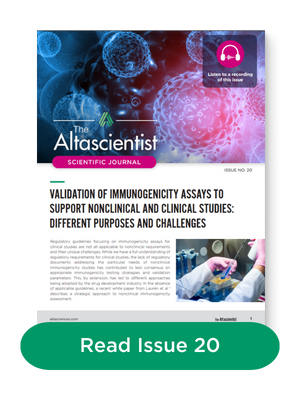ISSUE NO. 20 — Validation of Immunogenicity Assays
Regulatory guidelines focusing on immunogenicity assays for clinical studies are not all applicable to nonclinical requirements and their unique challenges. While we have a full understanding of regulatory requirements for clinical studies, the lack of regulatory documents addressing the particular needs of nonclinical immunogenicity studies has contributed to less consensus on appropriate immunogenicity testing strategies and validation parameters. This, by extension, has led to different approaches being adopted by the drug development industry.
In Issue 20 of The Altascientist, we review and share some of Altasciences’ approaches to validating immunogenicity assays for nonclinical and clinical studies, including insight on:
- how to plan for immunogenicity assessments
- drug tolerance
- positive control
- managing variability
- critical reagent validation and changes
- neutralizing anti-drug antibodies (NAbs)
Immunogenicity Assays in Nonclinical and Clinical Studies: Goals and Challenges
Nonclinical and clinical immunogenicity assessments each have their own challenges. For instance, achieving the appropriate level of drug tolerance in nonclinical studies may be difficult, and availability of critical reagents in the early stages of nonclinical studies versus a long-term supply to support clinical phases of the drug development program may present a challenge.
Clinical immunogenicity assessment aims to ensure patient safety, and provide the required information to support efficacy results by characterizing the immune response generated against the drug in terms of quality and quantity.
The purpose of nonclinical immunogenicity assessment of drugs destined for human use is primarily to support the understanding of toxicokinetic data. In nonclinical studies, the drug may be foreign to the host as the biotherapeutics are developed to mimic human molecules, and they may be administered at much higher doses than will be given to humans. Consequently, the immune response generated in nonclinical studies is often expected and must be interpreted with caution.
Sensitivity of the ADA method is sometimes an issue in clinical studies, especially when working with complex matrices such as those from oncology disease-type populations. Clinical studies also require additional levels of characterization of the immune responses, and the development of cell-based neutralizing antibody assays and domain binding specificity determinations, both of which can be complex and challenging, may be necessary.
Immunogenicity assays have to adapt as the drug development program progresses. Nonclinical assays may be qualified or validated with few requirements. However, immunogenicity assays used to support clinical studies must be validated with well-defined, regulation-compliant requirements.
How Altasciences Can Provide Assay Validation for Your Nonclinical and Clinical Studies
Altasciences’ deep knowledge of fit-for-purpose nonclinical and clinical immunogenicity assessment allows efficacious acceleration of drug development. We routinely tailor assay development and undertake a validation that supports the 3R principle of reduction, while saving time and resources.
We have nonclinical and early-phase clinical expertise, with integrated solutions to ensure that, as your drug development program accelerates from nonclinical to clinical phases, we achieve efficiencies through adaptation of the nonclinical ADA method to human serum. This is achieved by minimally changing the matrix, whenever possible, extensively assessing the appropriate parameters required for the clinical study, such as sensitivity, specificity, cut-points, and selectivity in normal or disease matrix, and adjusting the assay accordingly. The same critical reagents are ideally secured in large amounts in order to maintain assay reproducibility throughout the clinical study and are re-qualified in the new assay format.
Our nonclinical and clinical scientific experts work closely together to maximize efficiencies and share their knowledge and experience to deliver the best possible approaches to your immunogenicity assay requirements.
Explore all issues of The Altascientist in our Resource Center. And don’t forget to subscribe to “The Altascientist: Audiobooks” on Spotify, Apple Podcasts, or wherever you get your audio content.
